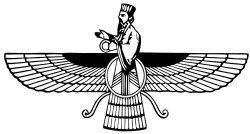| Yasht | |
|---|---|
 First page of the Yasht collections in Geldner's edition [1] | |
| Information | |
| Religion | Zoroastrianism |
| Language | Avestan |
| Period | Avestan period |
| Chapters | 21 |
| Part of a series on |
| Zoroastrianism |
|---|
 |
| |
A Yasht (Middle Persian : 𐭩𐭱𐭲, yšt') is a hymn of worship composed in the Young Avestan language and dedicated to specific Zoroastrian divinities. [2] The term commonly applies to the collection of 21 Yashts, [3] although it may also refer to other texts within the wider Avesta collection. [4]